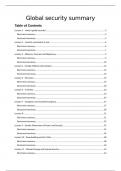Global security summary
Table of Contents
Lecture 1 – what is global security?.......................................................................................................3
Short text summary...........................................................................................................................3
Structured summary..........................................................................................................................4
Lecture 2 – Anarchy uncertainty & war..................................................................................................6
Short text summary...........................................................................................................................6
Structured summary..........................................................................................................................7
Lecture 3 - Alliances, Coercion and Diplomacy......................................................................................9
Short text summary...........................................................................................................................9
Structured summary........................................................................................................................10
Lecture 4 - Foreign Military Interventions............................................................................................14
Short text summary.........................................................................................................................14
Structured summary........................................................................................................................16
Lecture 5 - Terrorism............................................................................................................................19
Short text summary.........................................................................................................................19
Structured summary........................................................................................................................20
Lecture 6 – Civil War............................................................................................................................23
Short text summary.........................................................................................................................23
Structured summary........................................................................................................................24
Lecture 7 - Insurgency and Counterinsurgency....................................................................................27
Short text summary.........................................................................................................................27
Structured summary........................................................................................................................28
Lecture 8 -............................................................................................................................................31
Short text summary.........................................................................................................................31
Structured summary........................................................................................................................32
Lecture 9 - Gender Dimensions of Peace and Security........................................................................35
Short text summary.........................................................................................................................35
Structured summary........................................................................................................................36
Lecture 10 - Peacebuilding and its Critics.............................................................................................38
Short text summary.........................................................................................................................38
Structured summary........................................................................................................................40
Lecture 11 - Climate Change and Human Security...............................................................................43
Short text summary.........................................................................................................................43
, Structured summary........................................................................................................................44
Lecture 12 – Cyber War and Russian Information................................................................................47
Short text summary.........................................................................................................................47
Structured summary........................................................................................................................48
,Lecture 1 – what is global security?
Short text summary
The text discusses the concept of global security and the evolution of security studies
as a field within international relations. It highlights the contested nature of security
and the lack of consensus on its meaning. Traditionally, security studies focused on
states, strategy, science, and preserving the status quo. However, the understanding of
security has expanded to include factors such as military, political, economic, societal,
and environmental security.
The text presents two main philosophies of security. The first views security as the
accumulation of power, where having more power leads to increased security. The
second philosophy emphasizes that security is not derived from power but is based on
emancipation, justice, and human rights. It views security as a relationship between
actors rather than a commodity.
The question of whose security is addressed, with different perspectives considering
the security of states, human beings, societies, or the planet. The text acknowledges
that there is no consensus on what constitutes a security issue and who determines if
cherished values are threatened.
The history and development of security studies are discussed, highlighting its origins
in the 1940s in the United States. The emergence of nuclear weapons posed a
challenge that traditional military expertise could not address, leading to the
establishment of security studies as a distinct field. The text mentions the golden age
of security studies in the 1950s-60s, marked by the development of deterrence theory
and significant contributions to general theory.
However, the field later experienced a period of institutionalization and stagnation
from 1965 to 1980. Security studies became more narrowly understood as a subfield
of political science, losing its interdisciplinary nature. The role of think tanks shifted
from being innovative and interdisciplinary to producing narrow, technocratic
solutions. Peace research also developed as a separate track.
, The text discusses the subsequent disciplinary questioning and theoretical relaunch of
security studies. The 1990s saw a return to ambitious theorizing, with debates on
concepts of security and the role of security experts. The EU and the US had different
approaches, with the EU focusing on the politics of security and the US working on
general IR theories to understand contemporary security.
The text also highlights the challenges and opportunities for security studies in the
future. It suggests that the field has the potential to provide better theories due to its
theoretical productivity and relevance to public agendas. The emergence of new
schools in the EU and the need for engagement with rising powers such as China will
shape the future of security studies.
Overall, the text provides an overview of the contested nature of security, the
historical development of security studies, and the challenges and opportunities facing
the field in the future.
Structured summary
Introduction:
Security is a contested concept with no consensus on its meaning.
Traditional security studies focused on states, strategy, science, and preserving
the status quo.
Buzan's "People, States, & Fear" expanded the concept to include various
dimensions of security.
1. Understanding Security:
Security is the alleviation of threats to cherished values, with a focus on
survival and freedom.
Two main philosophies: a. Security as the accumulation of power and
resources. b. Security as emancipation, justice, and human rights.
2. Whose Security?
Academic perspectives differ on whether security refers to states, human
beings, societies, or the planet.
No consensus on who decides if cherished values are threatened.
3. The Evolution of Security Studies:





